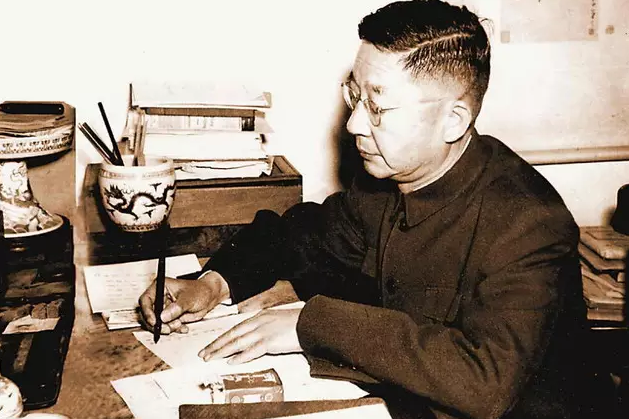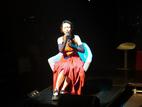To those born in the 1980s and had high school education, will for their whole lifetime remember the beautiful writings of Bing Xin's "Little Orange Light", Xu Dishan's "Falling Peanuts", and Lao She's "Winter in Ji Nan". What we see today as ordinary, they gave unique meaning and light in their era, reflecting the hope, beauty and strength of that era. And it is the light of the Christian faith.
The 23-year-old Lao She, speaking at the commemoration of the Double Ten at Nankai School in Tianjin, where he teaches, said: "I would like to explain 'Double Ten' as two crosses. For the sake of democracy and for the common good of our people, each of us must bear two crosses. Jesus bears only one. At the same time, because of the creation of a new society and culture, we must also be prepared to sacrifice and bear another cross in order to destroy and eradicate old vices, bad practices, and cultures as toxic as tobacco addiction. " Carrying the cross, in a spirit of sacrifice and fraternity, we construct a new culture that conforms to the teachings of Christ Jesus, and transform a society that has accumulated many disadvantages. This is the direction and cause of Lao She's lifelong efforts.
Lao She, formerly known as Shu Qingchun, was born into a poor family in the city of Beijing. His father, a flag soldier, was burned to death during the invasion of Beijing by the Allies of the Eight, and the two-year-old had to rely on his mother to do stitching work. Later he met a kind man, Liu Shoujin. With his support he completed primary school education. After Liu Shoujin used all his possessions for charity, Liu exited society to become a Buddhist monk known as Master Zongyue. This was the religion that Lao She came into contact with as a child and the love it brought him.
In 1922, Lao She attended an English course run by the Church of Christ in Gangwa, Beijing. He came into contact with Bao Guanglin, the pastor of the church, who had just returned from completing a degree in theology in England and was full of passion. Soon Lao She was attracted by the activities hosted by Bao Guanglin and participated in the "Truth Conference" and "Youth Service Department". These two organizations welcomed those outside of the church. Anyone, as long as he or she was dedicated to serving the community, could join. Because of being located in Beijing and its welcoming of people of different religious backgrounds, the organization attracted many young intellectuals and college students to join to not only provide social services, but also discuss education, society, and especially how to transform society.
It was in this church that Lao She got to know Xu Dishan, the author of "Falling Peanuts", and who had often visited the church. He also got to know Yi Wensi, a missionary of the London Missionary Society, who was a professor at Yanjing University at the time. Later, at Yi's recommendation, Lao She was able to study English at Yanjing University.
It was the Christian faith of tthese three men, Bao Guanglin, Xu Dishan and Yi Wensi, that had a great impact on Lao She. In 1922, he was baptized at the Gangwa City Church. What had really attracted him was the sacrifice and the spirit of the love of Jesus as well as the Kingdom of Heaven and idea of the serving society.
But when Lao She became a Christian, his church belonged to the London Missionary Society, not to the local Chinese church.
That same year, the non-Christianity movement began. Many colleges and churches responded by hiring Chinese principals, Chinese pastors, and the Gangwa City Church where Lao She attended was no exception. In 1923, the Gangwa City Church issued a statute from the Chinese Christian Church in Beijing, declaring a foreign association would become a Chinese one. It was drafted by Lao She. Later, he wrote "The London Church in Beijing City--the History of Remodeling the Chinese Church". It was aa detailed record of the process of the sinicization of the Church.
In September 1922, Lao She left Beijing to teach at Nankai School in Tianjin. At the beginning of 1923, he left Tianjin and returned to Beijing to zealously continue his career a socialist Christian, serving as director-general of the Beijing Christian Federation's Sunday School Committee. In addition he joined the Christian group "Love Society" and served as secretary. Its president was Wu Leichuan, a well-known Christian scholar at the time.
In September 1924, under the arrangement of the London Missionary Society's church, Lao She went to London to become a Chinese teacher. After arriving in London, he gave himself the English name Colin C. Shu. While in London, in order to practice English, he began reading English novels over and over again, which also laid the foundation for his later literary creations.
Lao She's Christian faith was similar to Bing Xin's, with the emphasis on spirituality and not much on ceremony. In the early 1930s, he went to Jinan Qilu University to teach where "Jinan's winter" was written. According to his wife, Hu Yuqing, "After marriage, Lao She never went to church or said grace before eating....he only admired Christ and made friends with others, and he carried the spirit of salvation, not bound by any forms."
Lao She put his Christian faith into his own works, in which he created a large number of images of common people who possessed the spirit of Christ, and of course, he also criticized those hypocritical Christians.
In the work "Black and White Lee", he created the black Brother Lee who, at the expense of his own marriage and even life, sacrificed for his younger brother. Black Brother Lee is a devout Christian who is familiar with the Four Gospels and does his daily prayers. In fact, the work is written according to the plot of Abraham's giving of Isaac, except that it is brother Lee who gives himself. It was just as Jesus came to the world to save the world and was willing to be crucified.
In the novel "Lao Zhang's Philosophy", he created the hypocritical and utilitarian old Zhang. It begins with Lao Zhang's funeral, disturbed by the decision whether it should be Islamic or Buddhist which is based on the price of meat at that time. If lamb is cheap, then it will be done the Islamic way. And if lamb and pork are very expensive, then the Buddhist way. Of course, the reception is to follow the Christian way because Christians like tea and do not have to put on a banquet. So Lao Zhang opened a school near some smelly ditches, and his own grocery shop has everything available from opium to matches. Lao Zhang's utilitarian mentality is not that of a Christian today, but is the typical image of many Christians of that era.
Lao Zhang's Philosophy also portrays the Christian characters, Long Shugu and Zhao Si. Long Shugu has converted to Christianity and enthusiastically preaches the Gospel. His plan however is earn money to buy bread and a few more copper coins. Zhao Si has converted to Christianity because neither Buddhists nor Confucianists pay any attention to him. Only Christians are willing to attend to him so he joins this global religion so that he can turn the 'white eye' (meaning to "stare hostily, to criticize or threaten) on those who ignore him.
The character that most possesses Jesus' spirit is Xiangzi in "The Camel Man". In it, Lao She gives the camel man, Xiangzi, the characteristics of Jesus--tenacity, responsibility, courage, love and sacrifice.
- Translated by Charlie Li












